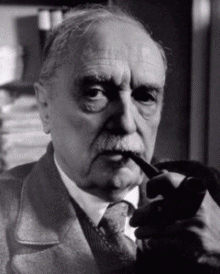
If, as many scholars believe, many gospel descriptions of the life and death of Jesus were fictionalized, should that matter to the modern Christian? Does the modern Christian have to believe that Jesus performed miracles, claimed to be the Messiah, and rose triumphantly from the dead? Not according to a giant of Christian theology, Rudolf Bultmann (1884-1976).
Bultmann accepted that the early Church labored to make Jesus intelligible to audiences in different situations and that it is no longer possible to recover Jesus as he actually was--the words used to describe his life were filtered through forty to sixty years of theological experience. He contended that it is not a legitimate goal of theologians to try to prove the Resurrection (or any other specific aspect of the life of Jesus) was an historical event. Bultmann particularly objected to the use of miracles as a means of proving the validity of faith.
Bultmann argued instead that the Resurrection is not a matter that can be proven, but a form of myth that can be used in accordance with faith. Resurrection, as Bultmann saw it, was easily suggested to the earliest Christians because of its place in Jewish apocalypticism. If Jesus' disciples had been Platonists, they more likely would not have used the word "resurrection," but rather a phrase such as "immortality of the soul."
Bultmann argued that Jesus was not fully the Messiah prior to the cross. The disciples of Jesus were able to experience redemption through the crucifixion because they wore--in effect--contact lenses with Jesus on them.
In Bultmann's view, each Christian must stuggle to find for himself or herself the redemptive significance of the cross. The saved individual, according to Bultmann, is one who has transcended reason, emotion, and the materialism of the world. To lead an authentic life, a person must choose a life, not live one merely shaped by the world.
Conservative critics of Bultmann claim that his repudiation of miracles and the historical truth of the passion story allows modern man to assign Christ his place in the world and thus causes faith to lose its saving power.
